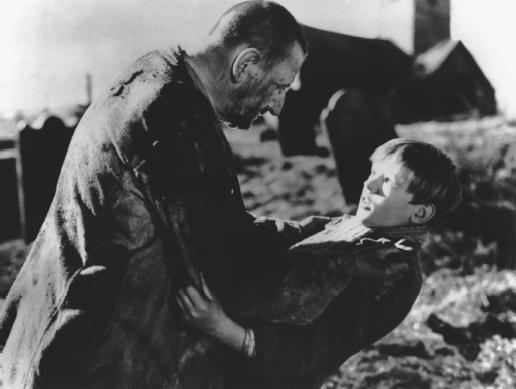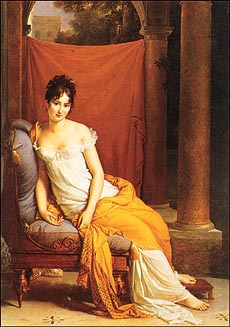 After our class last week, I am pretty sure I will be writing my final paper on Great Expectations -- and more specifically, on issues of youth & guilt. We talked a little bit about why young Pip feels so guilty and the idea of him being "naterally wicious." When considering the topic, I can't help but think of Neil Postman's The Disappearance of Childhood. He discusses the idea that childhood, in its very definition, cannot exist without shame. Postman defines childhood by its lack of secret adult knowledge. This inevitably ties in sexuality, which is a large part of these adult secrets. This ties back the possibility that Pip's feelings of guilt are driven by his sexual desires.
After our class last week, I am pretty sure I will be writing my final paper on Great Expectations -- and more specifically, on issues of youth & guilt. We talked a little bit about why young Pip feels so guilty and the idea of him being "naterally wicious." When considering the topic, I can't help but think of Neil Postman's The Disappearance of Childhood. He discusses the idea that childhood, in its very definition, cannot exist without shame. Postman defines childhood by its lack of secret adult knowledge. This inevitably ties in sexuality, which is a large part of these adult secrets. This ties back the possibility that Pip's feelings of guilt are driven by his sexual desires.
Tuesday, December 4, 2007
Great Expectations
 After our class last week, I am pretty sure I will be writing my final paper on Great Expectations -- and more specifically, on issues of youth & guilt. We talked a little bit about why young Pip feels so guilty and the idea of him being "naterally wicious." When considering the topic, I can't help but think of Neil Postman's The Disappearance of Childhood. He discusses the idea that childhood, in its very definition, cannot exist without shame. Postman defines childhood by its lack of secret adult knowledge. This inevitably ties in sexuality, which is a large part of these adult secrets. This ties back the possibility that Pip's feelings of guilt are driven by his sexual desires.
After our class last week, I am pretty sure I will be writing my final paper on Great Expectations -- and more specifically, on issues of youth & guilt. We talked a little bit about why young Pip feels so guilty and the idea of him being "naterally wicious." When considering the topic, I can't help but think of Neil Postman's The Disappearance of Childhood. He discusses the idea that childhood, in its very definition, cannot exist without shame. Postman defines childhood by its lack of secret adult knowledge. This inevitably ties in sexuality, which is a large part of these adult secrets. This ties back the possibility that Pip's feelings of guilt are driven by his sexual desires.
Tuesday, November 27, 2007
Great Expectations
 Just a few notes to self before I actually finish reading the book -- two (rather broad) things to keep in mind: women & aging. From the very beginning, there seems to be a pretty sharp difference between male and female characters. Pip knows his parents only as well as he knows their tombstones. His mother's inscription reads, "Also Georgiana Wife of the Above" on a tombstone that made Pip believe she was "freckled and sickly." Pip's sister, Mrs. Joe, wife of blacksmith Joe Gargery, is similarly defined by her husband -- but only in name really. She is abusive, red-faced, and dressed in an apron covered in pins & needles. Miss Havisham is heartbroken & Estella heartless. Age also seems like it may form an interesting theme. Pip's description of the church when the convict turns him upside down reminded me of a child's perception of the world as relative to the self. The convict also threatens Pip with the "young man," who is much meaner. The relationship between Miss Havisham and Estella also presents an interesting age duality. Also, when we are first introduced to Joe, Pip mentions that he treats him as a "larger species of child."
Just a few notes to self before I actually finish reading the book -- two (rather broad) things to keep in mind: women & aging. From the very beginning, there seems to be a pretty sharp difference between male and female characters. Pip knows his parents only as well as he knows their tombstones. His mother's inscription reads, "Also Georgiana Wife of the Above" on a tombstone that made Pip believe she was "freckled and sickly." Pip's sister, Mrs. Joe, wife of blacksmith Joe Gargery, is similarly defined by her husband -- but only in name really. She is abusive, red-faced, and dressed in an apron covered in pins & needles. Miss Havisham is heartbroken & Estella heartless. Age also seems like it may form an interesting theme. Pip's description of the church when the convict turns him upside down reminded me of a child's perception of the world as relative to the self. The convict also threatens Pip with the "young man," who is much meaner. The relationship between Miss Havisham and Estella also presents an interesting age duality. Also, when we are first introduced to Joe, Pip mentions that he treats him as a "larger species of child."
Saturday, October 13, 2007
into the wild
 I saw Into the Wild yesterday at the Sunshine theater. Among the people I went to see it with, there were mixed reviews to say the least. Although I'm not really sure how I feel about the movie as a whole (and I wouldn't suggest anyone pay eleven dollars to see it), it definitely reminded me of Rousseau. Here's the imdb profile for it: http://imdb.com/title/tt0758758/
I saw Into the Wild yesterday at the Sunshine theater. Among the people I went to see it with, there were mixed reviews to say the least. Although I'm not really sure how I feel about the movie as a whole (and I wouldn't suggest anyone pay eleven dollars to see it), it definitely reminded me of Rousseau. Here's the imdb profile for it: http://imdb.com/title/tt0758758/A recent college graduate feels suffocated by the pressures of society and his family, so he decides to leave it all behind. He donates his savings to charity and burns the rest of the cash he has before he goes on a journey into the Alaskan wilderness. There, he lives off the land and makes an abandoned old bus his home. He feels true happiness and gains wisdom, but finally (I'm about to give away the ending), he becomes trapped and overwhelmingly lonely. He eventually suffers from the poisonous effects of a plant he has accidentally eaten and starves to death. His demise, to me, speaks to Rousseau's message that you can never really go back.
Wednesday, October 3, 2007
the many many women in the life of benjamin constant
__________________________________________________________
Germaine de Stael (1766-1817)
lover, partner, & fellow intellectual.
 ___________________________________________________________
___________________________________________________________
Wilhelmina von Cramm
married & divorced in 1795.
___________________________________________________________
Isabelle de Charriere (1740-1805)
close confidante & friend.
 _________________________________________________________
_________________________________________________________
Charlotte von Hardenburg (1769-1845)
fellow divorcee & secret lover.
_________________________________________________________
Germaine de Stael (1766-1817)
lover, partner, & fellow intellectual.
 ___________________________________________________________
___________________________________________________________Wilhelmina von Cramm
married & divorced in 1795.
___________________________________________________________
Isabelle de Charriere (1740-1805)
close confidante & friend.
 _________________________________________________________
_________________________________________________________Charlotte von Hardenburg (1769-1845)
fellow divorcee & secret lover.
_________________________________________________________
Anna Lindsay (1764-1820)
mistress.
__________________________________________________________
Julie Talma (1756-1805)
close friend.
__________________________________________________________
Juliette Recamier (1777-1849)
indifferent to Constant's infatuation.
 _________________________________________________________
_________________________________________________________
mistress.
__________________________________________________________
Julie Talma (1756-1805)
close friend.
__________________________________________________________
Juliette Recamier (1777-1849)
indifferent to Constant's infatuation.
 _________________________________________________________
_________________________________________________________Sunday, September 16, 2007
As much as we may tear Rousseau apart in class, his last (& long) sentence in Part Two rung particularly true to me.
It follows furthermore that that moral inequality, authorized by positive law alone, is contrary to natural right, whenever it is not matched in exact proportion with physical inequality - a distinction which sufficiently determines what we ought to think of that form of inequality which prevails among all civilized peoples; for it is manifestly contrary to the law of nature, however defined, that a child should govern an old man, that an imbecile should lead a wise man, and that a handful of people should gorge themselves with superfluities while the hungry multitude goes in want of necessities.
He observes the contradictions of his own society, yet this makes me think of our own. Beyond the the idea of some having too much while others have none, we now observe that the rich stay thin while the poor grow obese. Older, and more experienced employees are fired and replaced with younger ones. Physical strength only gives an upper hand in low-paying labor jobs.
It follows furthermore that that moral inequality, authorized by positive law alone, is contrary to natural right, whenever it is not matched in exact proportion with physical inequality - a distinction which sufficiently determines what we ought to think of that form of inequality which prevails among all civilized peoples; for it is manifestly contrary to the law of nature, however defined, that a child should govern an old man, that an imbecile should lead a wise man, and that a handful of people should gorge themselves with superfluities while the hungry multitude goes in want of necessities.
He observes the contradictions of his own society, yet this makes me think of our own. Beyond the the idea of some having too much while others have none, we now observe that the rich stay thin while the poor grow obese. Older, and more experienced employees are fired and replaced with younger ones. Physical strength only gives an upper hand in low-paying labor jobs.
Tuesday, September 11, 2007
Aesop embodies an epigram not uncommon in human history; his fame is all the more deserved because he never deserved it... In the earliest human history whatever is authentic is universal: and whatever is universal is anonymous. In such cases there is always some central man who had first the trouble of collecting them, and afterwards the fame of creating them... There must have been something great and human, something of the human future and the human past, in such a man: even if he only used it to rob the past and deceive the future.
-G.K. Chesterton, introduction in a 1912 edition of Aesop's Fables.
I just picked up Aesop's Fables and began reading it a couple of days ago. This introduction reminded me of our discussion about Marx and the impossibility of forgetting the mother tongue.
-G.K. Chesterton, introduction in a 1912 edition of Aesop's Fables.
I just picked up Aesop's Fables and began reading it a couple of days ago. This introduction reminded me of our discussion about Marx and the impossibility of forgetting the mother tongue.
Thursday, September 6, 2007
Subscribe to:
Posts (Atom)
